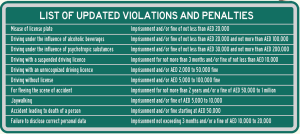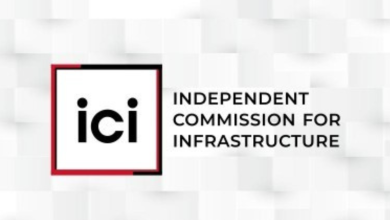For many overseas Filipino workers (OFWs), navigating the roads is a daily reality—whether commuting to work or heading out for fun—making it essential to stay informed about road safety measures.
In response to the rapid evolution of global transportation, the UAE government is rolling out important updates to traffic laws that will take effect in March 2025. These changes, outlined in Federal Decree-Law No. (14) of 2024 on Traffic Regulation, are designed to make the roads safer for everyone—drivers, passengers, and pedestrians alike.
As the number of vehicles on the roads continues to rise and new technologies transform how people travel, understanding these laws becomes crucial for residents, especially OFWs.
Lowering of minimum age for drivers
For the first time among Gulf Cooperation Council (GCC) countries, the UAE has lowered the minimum age
for obtaining a driving license. Thanks to recent amendments to the traffic law, 17-year-olds will soon be able to drive both cars and motorcycles.
Previously, those wanting a motorcycle license could apply at 17, but car drivers had to wait until they turned 18.
Now, those who reach 17 years of age can obtain licenses for both types of vehicles, opening up new
opportunities for young drivers. To get a license, individuals will still need to pass a medical exam and a driving test.
Embracing modern technology
Did you know that the UAE is already aiming to expand its transportation options with the use of driverless cars Although it is still in the early stages, Dubai has set an ambitious goal for the future: by 2030, 25 percent of all transportation trips in Dubai will be smart and driverless.
With the rise of electric cars and self-driving vehicles, the need to amend traffic laws to accommodate these innovations is more critical than ever.
As part of the updated decree-law, the Council of Ministers will establish guidelines for inspecting, registering, and licensing self-driving vehicles, as well as testing modern vehicle technologies, detailing specific procedures through a Cabinet Resolution.
In addition, modern technology will be utilized to develop electronic and smart programs for submitting license and permit applications.
Violations and penalties
With these updates come serious consequences for breaking the rules. With the following amendments in the traffic regulations, the UAE government has also warned of deterrent penalties, particularly for severe cases that threaten road safety.
This includes causing accidents resulting in the death of an individual, driving while under the influence of alcoholic beverages or narcotic substances, fleeing the scene of an accident, and jaywalking.
Here are some of the key violations and their corresponding penalties:
• Misusing license plates
If you think you can get away with the improper use of license plates, then think again. Under the new regulations, offenders may face imprisonment and fines of no less than AED 20,000 for individuals caught misusing license plates.
This means that actions such as forging or imitating license plates, installing plates or assisting in their installation in violation of the law, and distorting, obliterating, or altering license plate information can result in serious legal consequences.
Those who knowingly allow others to use license plates that have been defaced or altered will also be penalized, including those who transfer a license plate between vehicles without prior approval from the Licensing Authority.
• Driving under the influence
Driving under the influence of alcoholic beverages poses significant risks not only to the driver but also to everyone on the road. The penalties for such offenses are increasingly severe, including imprisonment and hefty fines ranging from AED 20,000 to AED 100,000. First- and second-time offenders face mandatory license suspensions, while those caught driving under the influence for third time can have their licenses canceled.
The laws are even tougher for those who drive under the influence of narcotic or psychotropic substances. In these cases, the fines can be even higher, ranging from AED 30,000 to 200,000. Additionally, offenders may also face license suspension or cancellation decided by the court.
• Accidents leading to deaths
The new regulations also impose strict penalties for individuals who cause the death of another person through negligent vehicle use. Drivers may face imprisonment and a fine of at least AED 50,000 if found responsible for such incidents.
However, if the fatality results from specific reckless behaviors—such as running a red light, driving under the influence of alcohol or drugs, operating a vehicle with a suspended or canceled license, or driving in flooded areas—the penalties escalate significantly. In these cases, offenders could face a minimum of one year in prison and fines starting at AED 100,000.
• Fleeing the scene of accident
Individuals who flee the scene of a traffic accident or fail to provide necessary information may face up to two years of imprisonment and fines ranging from AED 50,000 to 1 million.
Actions to be penalized include not stopping after causing injuries, failing to share information about an accident, fleeing from police, or deliberately colliding with vehicles used by traffic control or security personnel.
• Jaywalking
Tougher penalties are in place for pedestrians who cross roads outside designated areas. Previously, jaywalkers caught by the authorities must face a fine of AED 400, but under the new regulations, offenders may be imprisoned and pay a fine ranging from AED 5,000 to 10,000.
For crossings on roads with speed limits of 80 kilometers per hour or more, the consequences are even more severe: jaywalkers could face a minimum of three months in prison and fines starting at AED 10,000. This also means that if a jaywalker is hit by a vehicle or is involved in an accident, they may be unable to file a complaint or seek damages from the driver.

As the UAE adapts to technological advancements in transportation, these new traffic regulations underscore the government’s commitment to safeguarding the well-being of its residents. These measures encourage everyone—drivers and pedestrians—to follow the rules and reduce negligence on the roads.
However, it’s also essential to recognize that maintaining safety is a shared responsibility—and as an OFW, staying informed about these changes and adhering to traffic regulations are among the important ways to contribute to safer roads.




